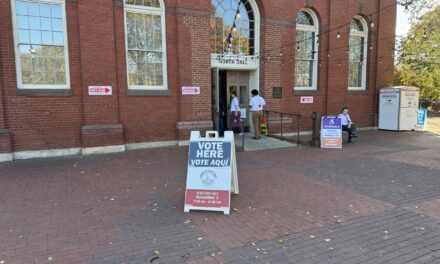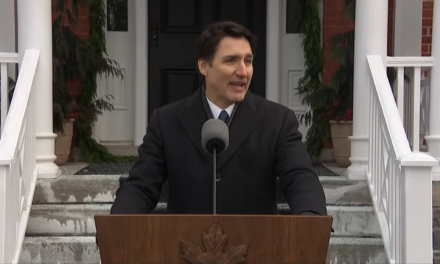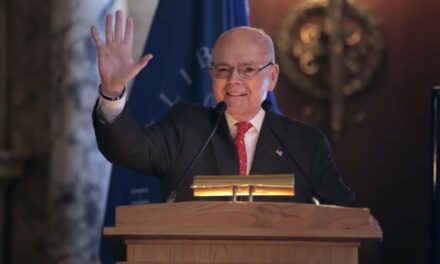We support our Publishers and Content Creators. You can view this story on their website by CLICKING HERE.
Over the last decade, America’s ruling class has used the threat of “mis-, dis-, and mal-information” to justify turning the awesome powers of the administrative state against domestic Wrongthinkers from elite orthodoxy. The most insidious and far-reaching manifestation of this phenomenon has been seen in the Censorship-Industrial Complex, which has eroded our First Amendment, thereby imperiling the republic itself.
Alarmingly, a new report indicates that the Supreme Court — which refused to bring the censorship regime to justice — not only shares this regime’s concerns about “disinformation,” but likewise supports robust and widespread action to “combat” it. The report comes from Chief Justice John Roberts himself.
Roberts took to his recently released annual review to elucidate what he sees as the key threats to the independence of his fellow justices, and thereby the rule of law itself. He distinguishes between “strong and passionate reactions” to and “informed criticism” of the court on the one hand, and independence-threatening “illegitimate activity” on the other.
Among the four types of activities that the chief justice identifies as illegitimate is “disinformation,” writing that disinformation includes “distortion of the factual or legal basis for a ruling,” which “can undermine confidence in the court system.” He laments that the court is ill-suited to “combat this problem” since judges are generally silent on their rulings.
“To make matters worse,” the chief justice adds, citing concerns laid out in his 2019 year-end report, “the modern disinformation problem is magnified by social media, which provides a ready channel to ‘instantly spread rumor and false information.’” Then, he endorsed “civic education as the best antidote for combating the epidemic of misinformation.”
Today Roberts asserts that “much more is needed — and on a coordinated, national scale — not only to counter traditional disinformation, but also to confront a new and growing concern from abroad … [whereby] hostile foreign state actors have accelerated their efforts to attack all branches of our government, including the judiciary.” They do so, he argues, through misrepresenting decisions “using fake or exaggerated narratives to foment discord within our democracy,” or other times by hacking sensitive information “in ways that compromise the public’s confidence in our processes and outcomes.”
“[W]e must as a nation publicize the risks and take all appropriate measures to stop them,” the chief justice concludes. [Emphasis mine]
Let us acknowledge that cynical efforts to delegitimize the Supreme Court, particularly when actors simply disagree with its rulings, are no doubt repugnant. And let us stipulate that a world in which people grappled with facts in evaluating rulings and dispassionately debated them on their merits would be a good one. Genuine civic education too would be more than beneficial. To boot, if our schools imbued critical thinking skills, and imparted basic knowledge, odds are the quality of ideas and rigor of arguments on social media would be infinitely higher.
But Justice Roberts here is betraying the same worldview as a U.S. government that itself has not only proven arguably the most prolific and powerful purveyor of “mis-, dis-, and mal-information” (see: Russiagate, for starters) but has weaponized itself against Americans harboring ideas it disfavors under the guise of combatting “mis-, dis-, and mal-information.”
The notion that there is an “epidemic of misinformation,” and that action “on a coordinated, national scale” is needed to counter it is precisely the logic used to justify the creation of the fed-led Censorship-Industrial Complex, and initiate the broader War on Wrongthink whereby in recent years, the feds have targeted all from January 6ers to concerned parents and devout Catholics like domestic terrorists.
Following in Biden’s Footsteps
It is striking to compare Chief Justice Roberts’ year-end report to the Biden administration’s first-of-its-kind National Strategy for Countering Domestic Terrorism, released in June 2021.
“Enhancing faith in American democracy demands accelerating work to contend with an information environment that challenges healthy democratic discourse,” the strategy reads.
The administration pledged federal authorities to work with “state, local, tribal, and territorial governments and in civil society, the private sector, academia, and local communities, as well as with our allies and foreign partners” to achieve goals including “enhancing faith in government and addressing the extreme polarization, fueled by a crisis of disinformation and misinformation often channeled through social media platforms, which can tear Americans apart and lead some to violence.”
Whether the chief justice endorses the commensurate practices the Biden administration has undertaken, running roughshod over our rights in the process, is unclear. He and his colleagues could provide clarity in their work. In this vein, the court’s refusal to take on the censorship regime during the 2023-24 term does little to dispel concerns.
A Warning from the Minority
Last summer, in Murthy v. Missouri, the majority by a 6-3 margin, including the chief justice, refused to rule on the merits of a case that put the fed-led censorship on trial by claiming the plaintiffs lacked standing. As Justice Sam Alito, joined by Justices Clarence Thomas and Neil Gorsuch, argued in his dissent, the court tortured the standards of standing to punt a case that had produced voluminous evidence of government-driven censorship.
Namely, evidence showed myriad federal authorities from the Biden White House to DHS and HHS had colluded, coerced, and cajoled social media companies, directly and via cutouts, to abridge en masse Americans’ protected speech, ranging from the Hunter Biden laptop story to election integrity and Covid-19. I reported exclusively for RealClearInvestigations on some of the stunning records of these efforts, documenting the targeting for censorship of figures including The Federalist’s Editor-in-Chief Mollie Hemingway.
The minority warned that:
What the officials did in this case was more subtle than the ham-handed censorship found to be unconstitutional in Vullo [another case before the Court last term], but it was no less coercive. And because of the perpetrators’ high positions, it was even more dangerous. It was blatantly unconstitutional, and the country may come to regret the Court’s failure to say so.
That malicious actors foreign and domestic can exploit social media for nefarious ends by propagating bad ideas or dishonest narratives more rapidly and at greater scale than at any time in history is true. But, as I testified before Congress in May 2023 in a hearing on the “nerve center” of fed-led censorship, in the Cybersecurity and Infrastructure Security Agency (CISA) – a key defendant in Murthy – “the worst idea of all is that government should be the arbiter of what we’re allowed to speak and hear.”
This would be so even if prominent figures up to and including the chief justice’s colleagues themselves never trafficked in mis- or dis-information; even if they were omniscient, fair, and wise.
I also testified that, historically, we would have held in contempt authorities who suggest we are incapable of thinking for ourselves, who do the thinking for us, and silence those who dare dissent.
Justice Roberts has long been concerned about protecting the court as an institution and, as he lays out in his year-end report, its independence.
To this end, he would be better served preventing leaks and holding leakers to account — a concrete assault on the court that it refused to vigorously pursue — than expressing such concern with how the public perceives and grapples with its opinions.
More importantly, the country would be best served if he and the court would participate in the project to dismantle the Censorship-Industrial Complex and disarm the weaponized administrative state, in defense of our most sacred rights.
Ben Weingarten is editor at large for RealClearInvestigations. He is a senior contributor to The Federalist, columnist at Newsweek, and a contributor to the New York Post and Epoch Times, among other publications. Subscribe to his newsletter at weingarten.substack.com, and follow him on Twitter: @bhweingarten.

 Conservative
Conservative  Search
Search Trending
Trending Current News
Current News 





